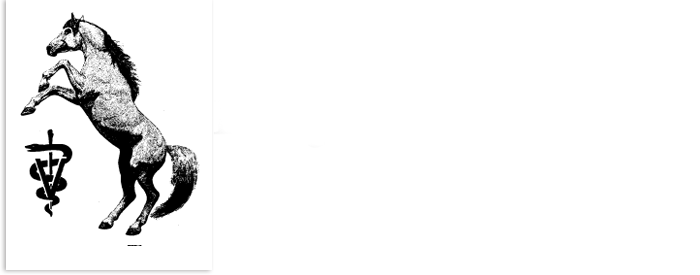Keeping Weight on the Older Horse
This is a problem I never thought I would face as a veterinarian. A horse that won't eat enough? Come on. You must be kidding. Yet very frequently I am asked to look at an older horse who just cannot keep his weight up. Usually the horse is over twenty. Often they are pastured with another younger horse. There are many options. I will describe the protocol I use very successfully in my practice. While this program does not work for every horse, my experience has been that most horses will gain between 80 and 120 pounds in the first two months on the intensive program. It has been very gratifying to see horses that would otherwise have had to been euthanized, up, around and happy again once their special needs are addressed.
The first step is to do a good physical exam and run a complete blood profile. This helps to rule out any physical problems a horse might have. For instance, when an internal cancer has spread, it is common for the horse to loose weight all over. Particularly around the muscles along the back.
If the physical exam and blood work are normal, I will start with the following program. First, I will de-worm the horse and float the teeth. As the horse enters it's twenties it begins to run out of teeth to chew its food correctly. By floating the horse's teeth you increase his ability to grind his food. This increases his ability to digest his food. Thus, it increases the nutrition he gets out of every bite he does eat. In addition, horses which are losing weight may be doing so because they have dental abnormalities. These include loose teeth which need to be pulled and hooks -over grown teeth- which are biting into the opposite gum line causing pain every time they chew. By pulling the teeth and grinding or cutting hooks, a horse can once again eat the food they want to eat without pain.
When stabled with younger horses, older horses are often chased away from the food. Besides getting less from the food they do get because of poor teeth, they end up getting less food. So, if the horse is in the other horses, I will ask that he be removed and fed separately. Once they are stable separately, I will take the horse off hay completely and switch his feed to free choice "All in One". This food is a chopped alfalfa and molasses mixture and is a completely balanced all inclusive feed for horses. Since older horses tend to eat slowly you can usually let them feed free choice. This means putting a 50 lb. bag of the "All in One" in a feeder and letting them eat as much as they want. If you did this with a younger horse they will get sick, but so far I have not had a problem with any older horses eating too much.
For many horses the above method is enough. However, the result make take months to see. A more aggressive program I use involves doing all of the above but also including addition steps. I will start the horse an a three shot program of anabolic steroids. These are hormones which stimulate the body to build muscle. They also increase appetite. Instead of worming every other month, I put the horse on the everyday wormer called STRONGID C. This wormer comes in 25 gallon tubs. The medication is mixed into alfalfa pellets. The horse will think you are giving a cup of alfalfa pellets, when in fact you are giving him de-worming medication on a daily basis. By eliminating from the horse's belly any worms on a daily basis, you increase the food that goes to the horse not the worms.
Additionally, I will add an extruded horse food to the diet. The brand I recommend is "Equine Balanced Diet" made by Wysong Corp. Equine Senior from Purina is also a good branded of extruded feed. Extruded horse feeds are similar to taking a sweet feed such as "Omalene" and running through a heating process. The feed ends up coming out like looking like dog kibble. The horse then needs only to crush the nuggets to start digesting the food as opposed to having to grind normal grain feed in order to get at it's nutrient core. This means the nutrients are more available to his body.
By combining all of the above most older horses put weight back on. It will never elimiate the need for monitoring but will add extra years of use and life to your horse.

